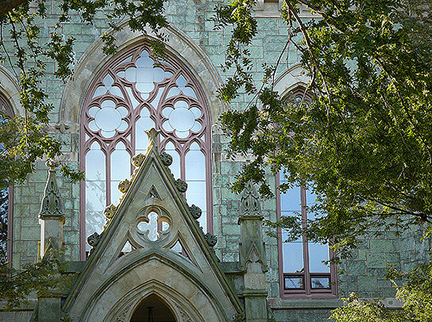Appointments | Penn President Amy Gutmann’s leadership team is taking shape, as the University filled two more senior-management positions this fall, selecting a seasoned and highly successful fundraiser from Johns Hopkins for the long vacant post of vice president for development and alumni relations (DAR) and naming the dean of the College, English professor Rebecca Bushnell, to head the School of Arts and Sciences.
John Zeller, associate vice president for development and alumni relations at Johns Hopkins Medicine and the Johns Hopkins Institutions, takes the reins at DAR (of which the Gazette is a part) on January 18.
“I am delighted that John will lead our ambitious plans in fundraising and alumni relations for the University and help us meet the goals articulated in the Penn Compact,” said Gutmann, referring to the plan proposed in her inaugural address. She called Zeller “a consummate collaborator” who would add “even more strength to an already impressively strong leadership team,” citing his “experience, creativity, and tremendous leadership skills,” as well as an “enormously successful track record developing strong fundraising and alumni-relations organizations.”
The president also thanked Medha Narvekar WG’86 “for her truly exemplary service and extraordinary success as interim vice president” since Virginia Clark’s departure from the post in July 2002. “We could not have asked for a more capable leader to direct the University’s development efforts during this interim period,” Gutmann said.
(Reached at his office in Baltimore, Zeller echoes Gutmann’s praise. “Medha and the entire senior staff have done a terrific job,” he says.)
Zeller has been at Hopkins since 1995, serving first as executive director for the Fund for Johns Hopkins Medicine before being named associate vice president in 2000. Under his leadership, more than $1.5 billion has been raised for the Fund over two fundraising campaigns.
Zeller says he is “truly delighted” to have been selected. He had been involved in some preliminary discussions about the DAR position before the hiring process was put on hold when President Emerita Judith Rodin CW’66 Hon’04 announced she was stepping down. For this round, he says, he was first approached in August. He called the interview process enjoyable and “very thorough,” with “numerous opportunities for me to interact with Dr. Gutmann and to really understand what her vision was and how we would work as partners in this—because clearly chemistry between this position and the president is key.”
Zeller wears “two hats” in his role at Hopkins. “My particular responsibility on a day-to-day basis is for all of medicine,” he says, “but also I am part of the senior leadership group for all of development and alumni relations for the Johns Hopkins Institutions,” which encompasses the full range of programs at Hopkins.
While Penn’s scope is larger, both are complex research universities with a number of parallels. One major difference—and advantage for Penn, he adds—is “the contiguous nature of all of the schools on one campus.”
Zeller first got bitten by the development bug while directing admissions at his alma mater, Elmira College, a small liberal-arts school in upstate New York. When the vice president for development left, Zeller proposed what amounted to a restructuring of the office and the school’s approach to what was then just beginning to be called “external affairs.”
The president took to the idea, and invited Zeller to “pull it together” in the interim. “So I actually had about 14 months of being thrown into the fray,” he says with a laugh. “I went from not having a whole lot of interaction in development to being thrown right into working with trustees and major gift prospects, annual giving, and it was a great experience.”
Zeller pursued his newfound career path in his next position as director of development at the Guthrie Medical Center. There, and in subsequent leadership roles at Ithaca College, the University of Rochester, and Hopkins, he has spent much of his time leading successful fundraising campaigns. During his time in Baltimore, he’s run two of them, back to back, starting the current campaign the day after the previous one concluded on June 30, 2000—something, he says, “I really don’t think has been done” by any other institution.
Of his new position, “I really am looking forward to getting there and meeting people and really understanding the institutional ethos,” Zeller says. As is the case for any higher-education institution, the challenge at Penn “is to be able to attract the resources necessary for its mission. I think Amy’s concept of the Penn Compact [“From Excellence to Eminence,” November/December] is a terrific centerpost” in building a case for supporting the University.
Penn’s alumni are “a wonderful constituency,” he adds, and says he hopes to strengthen ongoing efforts to “communicate better with alumni [and] engage people at all different levels of the institution’s future—not only from a philanthropic standpoint but from the admissions process all the way through to reunions.”
In the case of the SAS deanship, the institutional learning curve should be less steep. After the requisite national search to select a successor to outgoing Dean Samuel Preston, the search committee led by Dr. Eduardo Glandt GCh’75 Gr’77, dean of the School of Engineering and Applied Science, found the scholar next door—College Dean Rebecca Bushnell. She started on January 1.
Gutmann called Bushnell “an exemplary scholar and educator whose understanding of the critical role that a liberal-arts education plays in our society makes her a compelling choice.” Citing her tenures as dean of the College since 2003 and as associate dean for arts and letters for 5 1/2 years, Gutmann said that Bushnell “brings a wealth of experience within the Penn community that will serve her well.”
Bushnell came to Penn in 1982 as a lecturer in English and was made a full professor in 1995. Her scholarship deals with early modern English literature, culture, and history, and she has published four books on subjects ranging from the plays of Sophocles to early modern English gardens. Her fifth, Companion to Tragedy, is forthcoming this spring. She has also won a Lindback Award, Penn’s top honor for teaching excellence.
“I’m eager to get to work, collaborating with the faculty, my fellow deans, the provost, and the president to bring the School of Arts and Sciences and Penn to a new level of eminence,” Bushnell says.




